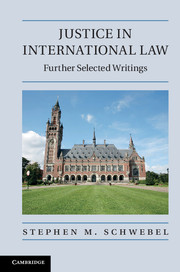Book contents
- Frontmatter
- Contents
- PART I International Court of Justice
- PART II International arbitration
- 12 A BIT about ICSID
- 13 The influence of bilateral investment treaties on customary international law
- 14 The United States 2004 Model Bilateral Investment Treaty: an exercise in the regressive development of international law
- 15 The United States 2004 Model Bilateral Investment Treaty and denial of justice in international law
- 16 Anti-suit injunctions in international arbitration: an overview
- 17 The law applicable in international arbitration: application of public international law
- 18 The validity of an arbitral award rendered by a truncated tribunal
- 19 The authority of a truncated tribunal
- 20 Injunction of arbitral proceedings and truncation of the tribunal
- 21 Public policy and arbitral procedure
- 22 The creation and operation of an International Court of Arbitral Awards
- 23 The Kingdom of Saudi Arabia and Aramco arbitrate the Onassis Agreement
- 24 The Southern Bluefin Tuna case
- 25 A celebration of the United Nations New York Convention on the Recognition and Enforcement of Foreign Arbitral Awards
- 26 Does the consent of the Contracting Parties govern the requirement of an “investment” as specified in Article 25 of the ICSID Convention?
- PART III Miscellaneous
- Collected publications, judicial opinions and book reviews
- Index
26 - Does the consent of the Contracting Parties govern the requirement of an “investment” as specified in Article 25 of the ICSID Convention?
from PART II - International arbitration
Published online by Cambridge University Press: 07 September 2011
- Frontmatter
- Contents
- PART I International Court of Justice
- PART II International arbitration
- 12 A BIT about ICSID
- 13 The influence of bilateral investment treaties on customary international law
- 14 The United States 2004 Model Bilateral Investment Treaty: an exercise in the regressive development of international law
- 15 The United States 2004 Model Bilateral Investment Treaty and denial of justice in international law
- 16 Anti-suit injunctions in international arbitration: an overview
- 17 The law applicable in international arbitration: application of public international law
- 18 The validity of an arbitral award rendered by a truncated tribunal
- 19 The authority of a truncated tribunal
- 20 Injunction of arbitral proceedings and truncation of the tribunal
- 21 Public policy and arbitral procedure
- 22 The creation and operation of an International Court of Arbitral Awards
- 23 The Kingdom of Saudi Arabia and Aramco arbitrate the Onassis Agreement
- 24 The Southern Bluefin Tuna case
- 25 A celebration of the United Nations New York Convention on the Recognition and Enforcement of Foreign Arbitral Awards
- 26 Does the consent of the Contracting Parties govern the requirement of an “investment” as specified in Article 25 of the ICSID Convention?
- PART III Miscellaneous
- Collected publications, judicial opinions and book reviews
- Index
Summary
These remarks endeavor to answer the question, does the consent of the Contracting Parties govern the requirement of an “investment” as specified in Article 25 of ICSID's formative instrument, the Washington Convention?
The short answer to that question is, no, the terms of the consent of the Contracting Parties do not of themselves determine what is an “investment” within the meaning of Article 25. But the terms of the consent of the Contracting Parties to ICSID's jurisdiction must be accorded, if not determinative weight, then great weight in deciding whether the requirement of an investment under the ICSID Convention is met.
Article 25(1) of the ICSID Convention provides that, “The jurisdiction of the Centre shall extend to any legal dispute arising directly out of an investment between a Contracting State … and a national of another Contracting State, which the parties to the dispute consent in writing to submit to the Centre.” Article 25(4) provides that, “Any Contracting State may … notify the Centre of the class or classes of dispute which it would or would not consider submitting to the jurisdiction of the Centre.”
While Article 25 goes on to define the meaning of “national of another Contracting State,” it does not define the meaning of “investment.” It deliberately does not. Definitions of investment were debated at the regional consultative conferences which the general counsel of the World Bank, Aron Broches, convened and conducted. Agreement upon a definition proved to be elusive.
- Type
- Chapter
- Information
- Justice in International LawFurther Selected Writings, pp. 281 - 286Publisher: Cambridge University PressPrint publication year: 2011



